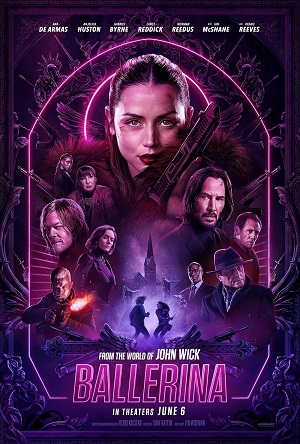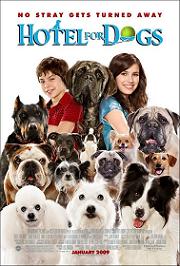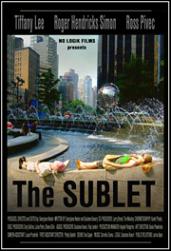Reviews for January 16th, 2009
Ballerina
Directed by Bertrand Normand.

In English, French and Russian with subtitles. This mildly engaging documentary follows five ballerinas who rehearse and perform at the famous Mariinsky Theater in St. Petersburg, Russia. The theater used to called the Kirov between 1935 and 1992. Students at the Vaganova Ballet Academy, a ballet school belonging to the Mariinsky Theater, desperately want to be accepted into the Mariinsky Theater and to become prima ballerinas. 18-year-old Alina Somova, for example, is just about to graduate the Vaganova Ballet Academy and looks forward to performing at the Mariinsky Theater where she got accepted into. She candidly explains how rigorous and challenging her busy training schedule is and that it takes discipline for her to adhere to it. A ballet teacher aptly states that students at the Vaganova school are accustomed to performing ballet during the day while, on the other hand, the ballet dancers at the Mariinsky Theater perform at night, sometimes ending their performance as late at 11 PM. Slightly older dancers, such as 24-year-old Svetlana Zakharova and Evgenia Obraztsova, who has also dipped her toes into the acting world playing a love interest in the French film Russian Dolls, also share their experiences and thoughts to the camera. Director Bertrand Normand blends interviews with ballerinas and ballet teachers along with performance footage which fans of ballet should appreciate to watch and listen to. However, Normand merely skims the surface of what it’s like to be a ballerina without delving deeply enough into the ballerinas’ lives. For example, it would have been provocative to ask the ballerinas what they woul do instead if they were to end up with a serious foot or leg injury that would put an end to their career in performing ballet? How do their parents, husbands/boyfriends or friends support their passion for ballet? How do they balance the other aspects of their life, i.e. family, friends, boyfriends, husbands, along with their passion without neglecting any of them? Sure, it’s interesting hear them discuss how ballet makes them feel inside, but sharper questions would have allowed for sharper, more insightful answers. At a running time of only 77 minutes, Ballerina feels mildly compelling and somewhat fascinating, but often tedious, incomplete and lacking enough insight about what it’s truly like to be a ballerina. Number of times I checked my watch: 4. Released by First Run Features. Opens at the Quad Cinema.
Cherry Blossoms
Directed by Doris Dörrie.

In English, German and Japanese with subtitles. Rudi (Elmar Wepper), a terminally ill man, travels to Japan with his beloved wife, Trudi (Hannelore Elsner), where he would be able to reunite with his son, Karl (Maximillian Brueckner), whom he hasn’t seen for many years. They stop in Berlin to visit the rest of their children, Karolin (Birgit Minichmayr) and Klaus (Felix Eitner), and they spend a little time together. Trudi, though, hasn’t told Rudi that he’s terminally ill yet and, before she could even get the chance to, she dies all-of-a-sudden, leaving him grief stricken. For the rest of the film, Rudi struggles to come to terms with Trudi’s death. He continues the planned trip to Tokyo, Japan alone to visit Karl, who rarely pays any attention to him. That’s where Rudi meets Yu (Aya Irizuki), a young, homeless Butoh dancer who helps him emotionally. Although he doesn’t sleep with her, Karl does suspect it when Rudi invites her over to use the shower to clean herself up. Up until the point when Trudi dies, the film actually feels quite absorbing and compelling thanks to a convincingly moving and charismatic performance by Hannelore Esler as Trudi. Her facial expressions speak volumes about what her character is going through. Once Trudi dies, though, the plot meanders with scene after scene of Rudi trying to cope with her death in different ways. There’s an unintentionally awkward moment that should have been moving when Rudi and Yu practice Butoh together for the first time. Writer/director Doris Dörrie includes lush cinematography and plenty of beautiful scenery, especially of Mt.Fuji and cherry blossoms, both of which have a metaphysical meaning that adds an interesting layer of lyricism and symbolism. However, Dörrie overemphasizes these symbolisms and others in a way that comes across as pretentious. She also includes too many unnecessary moments of silence as if the audience doesn’t already grasp the idea already that Rudi’s in state of meditation as he tries to make sense of his emotions. What exactly are the thoughts going on inside his head though? The somewhat dull screenplay doesn’t allow for enough insight into his mind so that you can answer that question fully enough or be able to immerse yourself in what he’s going through. Cherry Blossoms manages to be exquisitely shot and initially absorbing, but it often drags and, ultimately, feels contrived and overstays its welcome at an excessive running time of 2 hours and 7 minutes. Number of times I checked my watch: 5. Released by Strand Releasing. Opens at the Landmark Sunshine Cinemas.
Hotel for Dogs
Directed by Thor Freudenthal.

Based on the book by Lois Duncan. 16-year-old Andi (Emma Roberts) and her 11-year-old brother, Bruce (Jake Austin) have been orphans for the past three years and can’t seem to find parents who can tolerate Carl (Kevin Dillon) who are willing to let them stay at their home, but they don’t really take care of them with love and respect. In a silly subplot, both Lois and Carl aspire to become rock stars, although they clearly have no talent and are quite dim-witted. They’re even oblivious enough not to notice that Andi and Bruce have been hiding a pet dog named Friday from them. One day, Andi and Bruce stumble upon a dilapidated building that used to be a hotel which now houses a bunch of stray dogs that wandered in there. They decide to rescue other stray dogs and construct for them a more comfortable and survivable living condition inside the hotel with the help of two pet store employees, Dave (Johnny Simmons) and Heather (Kyla Pratt) as well as Mark (Troy Gentile), a fat kid who provides some of the comic relief. Meanwhile, they try to avoid the pound from collecting the dogs. It takes a lot of suspension of disbelief to find the plot to be engaging given all of the implausible moments and plot holes, i.e. how the kids manage to build all those devices for the dogs inside the hotel so quickly. The corny and silly dialogue, written by Jeff Lowell, Bob Schooley, Mark McCorkle, will often make you roll your eyes unless you’re a little kid, but at least the cute dogs themselves manage to make the film amusing to watch whenever they’re onscreen. During the scenes meant to be dramatic or thrilling that involve humans, Hotel for Dogs becomes contrived and loses its momentum. On a positive note, director Thor Freudenthal moves the film at a brisk pace, a lively soundtrack and footage of each of the crew members with their pets, including one cat, as the end credits roll. Number of times I checked my watch: 4. Released by Paramount Pictures.
The Pervert’s Guide to Cinema
Directed by Sophie Fiennes.

This mildly fascinating documentary explores philosopher/psychoanalyst Slavoj Žižek’s interpretations of films ranging from horror to sci-fi, thriller and comedy. His theory that a film tells you what to desire isn’t something particularly shocking or new. After all, films are manipulations of visuals in order to reach a desired effect depending on the genre. Anyone could have figured that out. He picks apart scenes from Alfred Hitchcock’s The Birds and, while talking, he paddles a rowboat with birds flying around him in an attempt to recreate the scene from the film. When he refers the birds as having “incestuous energy”, it’s hard not to laugh at such bizarre choices of wordings. There’s also an interpretation of Hitchcock’s Psycho as Žižek sits in a darkened basement room and explains how the three floors of The Bates Hotel represent the Id, Ego and Superego. As he goes on to interpret scenes from other films like Blue Velvet, Vertigo, Lost Highway, Dogville, The Piano Teacher, Persona, The Matrix, The Conversation, Solaris, Stalker, films of The Marx Brothers and City Lights and The Wizard of Oz, he just seems to be rambling on and on trying to find more sweeping philosophical/psychological observations that give a purpose to those scenes. For example, in The Matrix, besides a blue pill and a red pill, he claims that there’s a third pill: reality internalized within fantasy. Žižek essentially talks a lot with his booming voice and a thick accent, but he actually says very little and fails to adequately explain the statements that he makes. The real question he should have answered more often is the most basic one: “So what?”. Director Sophie Fiennes separates the documentary into three parts, none of which are provocative, insightful, revealing or intriguing enough to keep you truly engaged. Žižek's monologues eventually feel repetitive and grating. Had he interviewed or discussed these topics with film scholars rather than merely talking to the camera throughout most of the film, it might have lead to more coherent and rational observations. Sure, he's entitled to his own opinions and interpretations of films, but his thoughts aren't put together in a way that's particularly compelling. At a running time of 2 hours and 30 minutes, The Pervert’s Guide to Cinema often drags and leaves you feeling underwhelmed. Number of times I checked my watch: 5. Released by Lone Star Productions. Opens at the IFC Center.
The Sublet
Directed by Georgiana Nestor.

Walter (Roger Hendricks Simon), a 71-year-old widower, lives alone with his cat on the Upper West Side of Manhattan. He leads a fairly mundane life until one day when he mistakenly receives a call from someone who’s looking for a sublet. In an attempt to make his life less mundane, he decides to place a fake ad for a sublet so that he could meet a variety of interesting people who knock at his door. Among those who respond to the ad is Maggie (Tiffany Lee), a 19-year old girl from Poughkeepsie who runs away from home to pursue a music career in New York City. Meanwhile, a hit man (Ross Pivec) breaks into Walter’s apartment in order to gain access to someone outside of the building whom he’s assigned to kill. Walter convinces Maggie to spend time with him to get to know her better. Throughout the course of 24 hours, Walter and Maggie develop a platonic friendship that makes both of their lives more lively and profound. Walter still hasn’t gotten over the death of his beloved wife whose photo lays framed in his apartment, although first-time director/co-writer Georgiana Nestor wisely doesn’t pound the audience over the head with that message and, instead, opts for a more graceful and subtle way of showing it. Nestor allows you to get to know Walter at the very beginning by introducing you to the many intricate details of his secluded lifestyle. Even the colors of the clothes that he wears look monotonous and mundane. Once Walter crosses paths with Maggie later on, you want him to find true happiness. Roger Hendricks Simon’s performance as Walter balances just the right amount of pathos, charisma and great comic timing so that you’re always captivated whenever he’s onscreen. He often seems like a less neurotic version of Woody Allen. The sequence when Walter meets a wide variety of potential tenants for the fake sublet and reacts to their eccentricities is laugh-out-loud funny and offbeat, especially when a gay couple show off their strange fetish for his refrigerator. It's also quite amusing and engaging to watch Walter and Maggie interact with one another and behave free-spiritedly. They both open each another's mind and heart in quietly poignant ways. The smart, sensitive screenplay by co-writers Georgiana Nestor and Gautama Kavuri expertly blends drama, comedy and suspense together in an unpredictable way that gives the film an offbeat, delightful and refreshing charm. At an ideal running time of 78 minutes, The Sublet doesn't overstay its welcome and ultimately manages to be a refreshingly original, witty and crowd-pleasing gem. Number of times I checked my watch: 1. Released by No Logik Films. Opens at the Quad Cinema.
Main Page
Alphabetical Menu
Chronological Menu
______________________________________________________
|





